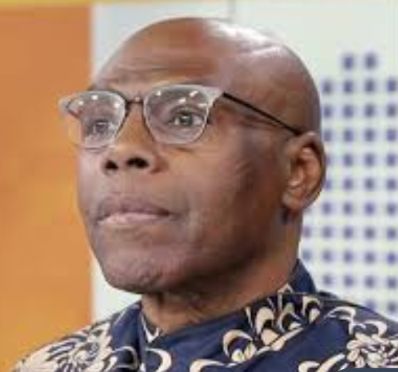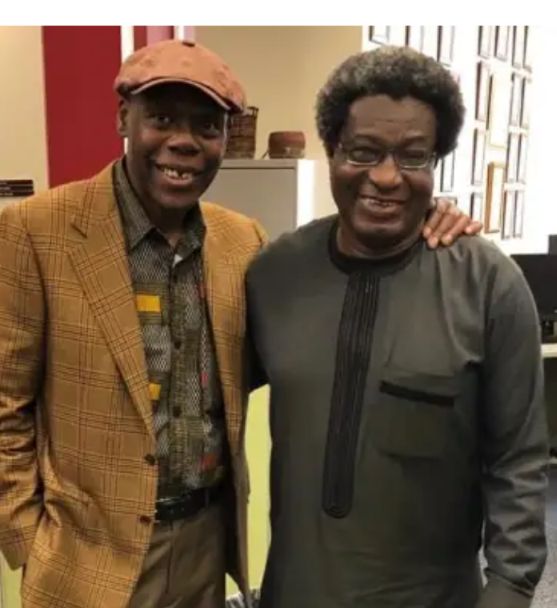
About two years ago, a former student of mine at the International Institute of Journalism, Abuja, reached out to me to link her up with Shaka Ssali, whose voice through the years, had become emblematic of the African Service of the Voice of America (VOA).
Apparently, she had seen my social media post in late 2019, when I met the baritone-gifted Ssali during a visit to the Washington Studios of VOA. It was a memory laden moment as both Ssali and I shared what we knew of each other from afar as journalists and broadcasters.
That post about my meeting with Ssali, had mentioned his deep respect for Nigeria and my former student wanted to contact him for her proposed documentary on the late Dr Nnamdi Azikiwe.
She eventually got him to be on the documentary which was concluded recently, but he passed away this week and will not get to see the final product, including his input.
In the annals of African journalism, few names resonate with the gravitas and warmth of Shaka Ssali, the Ugandan-born broadcaster who, for over two decades, turned a microphone and a camera into a lifeline for a continent.
Ssali, who passed away on 27 March, 2025, at the age of 71 in Virginia, USA, was more than a journalist—he was a storyteller, a truth-seeker, and a bridge between Africa and the world. His death, just weeks shy of his 72nd birthday, marks the end of an era, but his legacy, forged through the airwaves of Voice of America’s (VOA) Straight Talk Africa, will echo for generations.
Born in the rolling hills of Kabale, Uganda, Ssali’s journey was anything but conventional. He was a child of modest beginnings, the son of John Mushakamba, a respected businessman, and Joyce, who instilled in him a curiosity that would shape his life. As a boy, he sat by the fireplace with his father, listening to the crackle of a Pie radio, captivated by the voices that floated through the ether.
Those evenings planted a seed—one that would sprout years later into a career that redefined African media. But the path was winding. Dropping out of school in 1968, Ssali joined the Ugandan Army at 16, rising to the rank of lieutenant by his early 20s. It was a detour shaped by the cinematic allure of cowboys—John Wayne and Clint Eastwood loomed large in his youthful imagination—but also by the stark realities of a nation under Idi Amin’s shadow. In 1974, after his name surfaced in a failed coup attempt, Ssali fled to Kenya, then to the United States, carrying little more than resilience and a hunger for knowledge.
What followed was a transformation as remarkable as it was improbable. In America, Ssali rebuilt himself, brick by intellectual brick. He earned a bachelor’s degree, two master’s degrees, and a doctorate in cross-cultural communication and history from UCLA—a testament to the “transformational power of knowledge” that one interviewer aptly ascribed to him.
A former Ford Foundation Fellow, he collected accolades like milestones: a United Nations Peacekeeping Special Achievement Award in International Journalism, VOA’s Best Journalist Award, and, just last year, a Lifetime Achievement Award from the Ugandan North American Association (UNAA). Yet, for all his academic and professional triumphs, Ssali remained the “Kabale Kid”—a nickname he wore with pride, a nod to the roots that grounded him.
In 1994, Ssali joined VOA, and in August 2000, he launched Straight Talk Africa, a program that would become his megaphone and his monument. For 21 years, until his retirement in May 2021, he hosted the weekly show with a signature blend of calm authority and incisive curiosity. From Washington, D.C., his voice reached millions across Africa via radio, television, and the internet, dissecting the continent’s triumphs and tribulations with equal measure.
Presidents and prime ministers—Uganda’s Yoweri Museveni, Rwanda’s Paul Kagame, Zimbabwe’s Robert Mugabe—sat across from him, fielding questions that cut through platitudes. Intellectuals like Nobel laureate Wangari Maathai and artists like Hugh Masekela shared his stage, their voices amplified by his platform. Ssali didn’t just interview; he convened a continental conversation, one that spanned democracy, governance, and the dreams of Africa’s youth.
What set Ssali apart was his humanity. He once said, “Information is the oxygen of democracy,” a credo he lived by with every broadcast. His guttural voice, tinged with the cadence of Kabale, carried a sincerity that disarmed guests and listeners alike. He was fearless but fair, a journalist who challenged power without losing sight of the powerless. “Get better, not bitter,” he often urged, a mantra that reflected his own journey from exile to eminence. His other signature phrase, “Keep the African hope alive,” became a rallying cry for a continent too often defined by its struggles rather than its potential.
Ssali’s impact transcended the studio. In Kampala, Dar es Salaam, and Abuja, his name opened doors—literally. Friends recount tales of leveraging his fame for hotel discounts or market cred, a testament to his reach. In Uganda, where he returned periodically, he inspired a generation of journalists. Andrew Agaba, station manager of Voice of Kigezi radio, credits Ssali with forging a partnership that brought Straight Talk Africa to local airwaves.
“He showed us what was possible,” Agaba says. Across the diaspora, from the UNAA convention to the streets of Kabale, he was a symbol of what discipline and determination could achieve.
His retirement in 2021 was not an end but a pivot. Replaced by South African journalist Haydé Adams, Ssali planned to mentor youth and share his vast reservoir of wisdom. Even as health challenges mounted in his final years—details of which remain private—he remained a beacon. In April 2024, he debunked death rumors with a chuckle, declaring, “I am alive and kicking,” a moment that captured his enduring spirit.
Tributes have poured in since his passing. VOA called him “a revered broadcaster” whose “indelible legacy” shaped African journalism. Former Ugandan Prime Minister Ruhakana Rugunda, a childhood friend, recalled their days debating politics in Kabale’s gardens. Bobi Wine, Uganda’s opposition leader, mourned “a giant” whose voice championed human rights. Across X (formerly known as Twitter), admirers hailed his passion for truth, his wit, and his unflagging hope.
 …Dr. Emman (right) with Shaka Ssali…
…Dr. Emman (right) with Shaka Ssali…
Shaka Ssali’s death leaves a void, but his life leaves a blueprint. From a school dropout to a Ph.D., from a soldier to a storyteller, he embodied resilience. His Straight Talk Africa was more than a show—it was a mirror held up to a continent, reflecting its complexities and its promise. As Africa navigates an uncertain future, Ssali’s voice, now silent, still whispers through the static: Keep the hope alive. For that, we owe him not just our gratitude, but our action.
*Dr Shehu is the Director, International Institute of Journalism, Abuja



